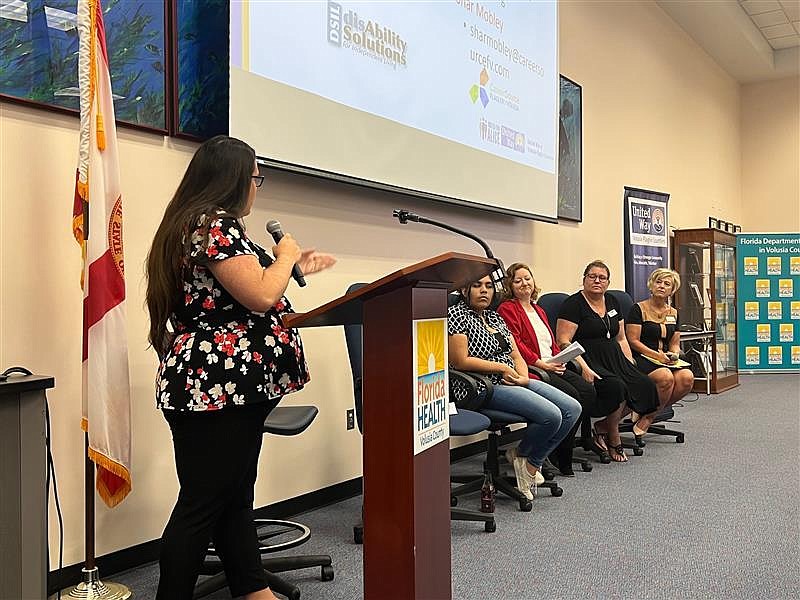- April 26, 2024
-
-
Loading

Loading

In Volusia and Flagler County, 71.5% of families who have a child with a disability struggle to make ends meet.
This statistic, part of United Way's Focus on ALICE: Disabilities report, was startling, said Amanda Lasecki, vice president of operations at United Way of Volusia-Flagler Counties. The ALICE report (Asset Limited, Income Constrained, and Employed) is typically released every two years, but these new focus reports hone in on one sector of the ALICE population and provides specific data.
On Sept. 14, United Way presented the report's findings at One Voice for Volusia, along with a panel composed of other experts on the topic.
"I think hearing from people who are working with the disability community every day is really helpful, because they see the challenges that are faced every day and they can share those, but also for the attendees to hear the different perspectives," Lasecki said.
Over 45,000 households in Volusia and Flagler are at or below the ALICE threshold, according to United Way. In Volusia, 53.25% of all households that includes a person with a disability is at an ALICE threshold or below. In fact, the report found that 95% of all ALICE individuals with a disability in Volusia County are rent-burdened.
And as costs continue to rise due to inflation, Lasecki said it'll likely get harder for these families to sustain themselves.
"I think it's going to continue to be a challenge, not just for those with disabilities but the entire ALICE population," Lasecki said.
The ALICE report noted that, according to the Federal Poverty Level, 16% of people with disabilities in Florida lived in poverty in 2019. But the ALICE report noted that an additional 37% — over twice as many — fell under the ALICE umbrella. Though they earned over the Federal Poverty Level, these families were still experiencing financial hardship.
The report also notes that "The inequities and barriers to financial stability that many people with disabilities face were exacerbated during the dual health and economic crises of the COVID-19 pandemic."
These challenges included "a higher susceptibility to severe illness and death, a risk of being triaged out of COVID-19 treatment when supplies became scarce, limited options for those in congregate settings to transition to community settings, lack of access to in-person special education services and supports, low priority for vaccine distribution, an extensive shortage of direct care and support workers, and substantial communication barriers due to mask-wearing and social distancing," the latter particularly affecting people who were dead, hard of hearing, and or blind.
People below the ALICE threshold had added challenges such as finding and keeping employment, limited income and savings and the additional costs associated with living with a disability.
For Dorothy Lefford, clinical director of pediatric therapy at Easterseals Northeast Central Florida, the report's findings weren't a surprise. It was further proof of what she sees every day, especially regarding expenses.
"And if you're already at risk financially, it just compounds that risk," Lefford said.
Co-pays add up when a family needs to bring in their child with autism to three therapies a week, she explained. Insurances can be very limiting for families, and they often find themselves paying out of pocket for extra services. Transportation is also a big cost for families and often can be a struggle depending on the child's disability. As an example, Lefford said that one of Easterseals' families chooses doctors and specialists within walking distance from their home, and sometimes that means, instead of opting for the doctor who will provide the best care, the one they can access the easiest.
Childcare, she added, is another expense that families may be forced to face. Oftentimes one of the parents will decide to stay home with the child.
"Our families are having to make very tough decisions every day," Lefford said.
Being able to share the data with the community is a start finding ways to help ALICE families, Lasecki said. After presenting at One Voice for Volusia, they now not only have the data, but also community input on the challenges that these families face as a result.
For example, the ALICE report notes that 57% of people with disabilities in Florida in 2019 who struggled with self-care were below the ALICE threshold.
"What was really interesting to me was learning more about that population, and that a lot of individuals in our community may have issues with basic self care, and that could even include something as simple as forgetting to set their alarm or forgetting to turn off the stove — those kinds of simple things that we take for granted every day," Lasecki said. "But those are the things that are likely to have them fall into the ALICE threshold."
Lefford said Easterseals has increased its number of case managers to help families. Easterseals also has a grant that covers meeting with the pediatric navigator for families with a child or young adult — up to 22 years old — in order to help connect them to services and resources.
Families in or below the ALICE threhold are fighting every day to stay afloat, Lefford added — they fight for insurance, inclusion, schools needs, better wages, and for their own family units.
"At the end of the day, it's up to us to fight for the family, and that's where I think our collaboration in this community can be very valuable," Leffords said. "I think everybody's missions and hearts are in the right places, and just hopefully we can come up with creative ways to open up some new doors."
To find out more about the ALICE report, visit https://www.unitedwayvfc.org/alice. A focus report on children was also released, and later this fall, United Way will release an ALICE report on veterans.